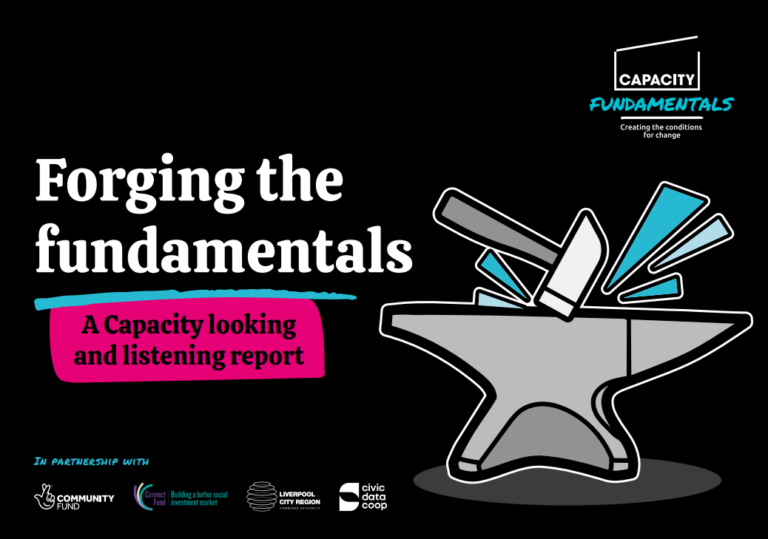Forging the fundamentals: What we heard and what's next.
- March 6, 2024
- Categories: Capacity Insights, Stay in the Loop

Late last year, we engaged with 100 public and third sector leaders from across Cheshire and Merseyside. We wanted to learn more about their day jobs, what was going well, but also what was keeping them up at night. Nothing was off the table. We listened to their views, heard their ambitions (and frustrations), and started to think about the shared challenges and opportunities to try something different.
One theme that came out loud and clear was the need to build a space where people delivering public services could talk and share their experiences and ambitions. In fact, the people we spoke to wanted to do more than just talk. They wanted to change how things are done in their sector; to mobilise like-minded leaders and doers in the region to radically rethink public services; to be the spark that challenges the status quo.
Encouraged by these insights, we launched ‘Capacity Fundamentals’ – a programme designed to accelerate those ambitions and bring together public sector leaders, social game-changers and the next generation of new thinkers in public service design. Our first event ‘Fundamentally Different’ takes place on Tuesday 19 March in Liverpool City Centre. It’s an opportunity to reveal the themes and insights from our conversations with those public sector leaders and to be inspired by some of the UK’s most radical public service thinkers and doers.
Fundamentally Different: The Event
We believe when creative leaders, thinkers and doers come together, great ideas become more than possibilities. They start to shape a vision for public services as they could be. That’s why we’ve invited speakers and panellists from the frontline of new thinking in public service design to the stage.
This event will celebrate the people and organisations disrupting public services, it’ll take a keen focus on tackling outdated approaches and giving more power to our communities – something that can never be the responsibility of one organisation. Real change needs all sectors involved and represented, something that will only become a reality with a dramatic cultural shift. We’ll be bringing radical challenge to “we’ve always done it this way” thinking. Asking leaders and their organisations what does the future of public services look like? How do you see yourselves in that future? Is there another way to provide public services? How brave and bold are you willing to be with your leadership?
By offering a place where people can be open, collaborative and free-thinking, we’ll start to create the conditions for change, and with it real-life impact for the people in our region.
So back to those interviews, what findings are we going to be exploring?
During 2023, we combined three themes of work under the ‘Fundamentals’ umbrella, taking a slightly different look at the challenges we face:
Through our interviews (and the emails, attachments and ‘just another thought’ messages that followed), we collated a huge array of thoughts, ideas, and knowledge. The current and recent experiences shared were vast, with complexity, contradictions and wide-ranging opportunities and challenges. We discovered people were keen to share, they had enthusiasm that matched ours and wanted to act as enablers, to work together to try and do things differently.
So, what did we find out? Our conversations brought six key themes to the fore, some we absolutely could have guessed – but this work gave us much more detail as we started to understand more about the ‘desks’ they crossed and the complexity that added. Whilst some felt obvious, some findings felt quieter, less prominent before this work – combined they gave us a great steer to take into our event, the start of a framework to get us all thinking.
What was clear from our conversations was that there is too much energy and focus going into strategy and governance and not enough resource being put into making real change happen for the people of Cheshire and Merseyside. We heard a desire for creativity and flexibility and a willingness towards ‘let’s give it a go’. Everyone we spoke to recognised that ‘making public service people services’ doesn’t just happen, that new approaches need to break the mould and that transformation can’t wait.
Against a backdrop of brutal cuts, public and third sector leaders across the UK know they need to do things differently. We’re committed to challenging the status quo of public service design. We believe creativity and innovation isn’t a luxury. It’s a necessity for shaping the future of public services in the UK. We’re excited to build our group of like-minded people – leaders, thinkers and doers ready to go beyond the talking and put new ideas and new thinking into action.